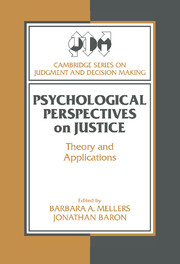Book contents
- Frontmatter
- Contents
- Series preface
- Contributors
- Part I Introduction
- Part II Psychological perspectives
- Part III Economic perspectives
- Fairness in groups: Comparing the self-interest and social identity perspectives
- Heuristics and biases in equity judgments: A utilitarian approach
- Trade-offs in fairness and preference judgments
- Information, fairness, and efficiency in bargaining
- Part IV Variations in perspectives on justice
- Part V Policy perspectives
- Part VI Conclusion
- Name index
- Subject index
Heuristics and biases in equity judgments: A utilitarian approach
Published online by Cambridge University Press: 24 October 2009
- Frontmatter
- Contents
- Series preface
- Contributors
- Part I Introduction
- Part II Psychological perspectives
- Part III Economic perspectives
- Fairness in groups: Comparing the self-interest and social identity perspectives
- Heuristics and biases in equity judgments: A utilitarian approach
- Trade-offs in fairness and preference judgments
- Information, fairness, and efficiency in bargaining
- Part IV Variations in perspectives on justice
- Part V Policy perspectives
- Part VI Conclusion
- Name index
- Subject index
Summary
Human judgments and decisions have been compared to normative models that specify how judgments and decisions should be made. Such comparisons often find discrepancies between people's goals and the decisions meant to achieve those goals. These discrepancies are often called biases, and the informal ways of thinking that lead to them are called heuristics. Evidence of biases is useful because we can often find ways of teaching people better ways of thinking, better heuristics, or we can learn when we need to work around the biases by using more formal methods of analysis. In these ways, the discovery of human error leads to ways to improve the human condition.
In this chapter, I shall apply this comparative approach to the study of equity judgments. Of course, even the earliest studies of equity judgments were implicitly concerned with criticizing and improving them. However, by making the interest in criticism more explicit than previous writers, I am forced also to be more explicit about the normative theory to which the judgments are compared. The normative theory I shall defend is utilitarianism, the view that the best decision is the one that maximizes expected utility over all who are affected. I take utility to be the extent to which goals are achieved in fact. Utility in this sense need not be the same as utility as expressed in decisions or judgments, which usually involve implicit predictions of utility in my sense (Kahneman & Snell, 1990).
- Type
- Chapter
- Information
- Psychological Perspectives on JusticeTheory and Applications, pp. 109 - 137Publisher: Cambridge University PressPrint publication year: 1993
- 30
- Cited by

